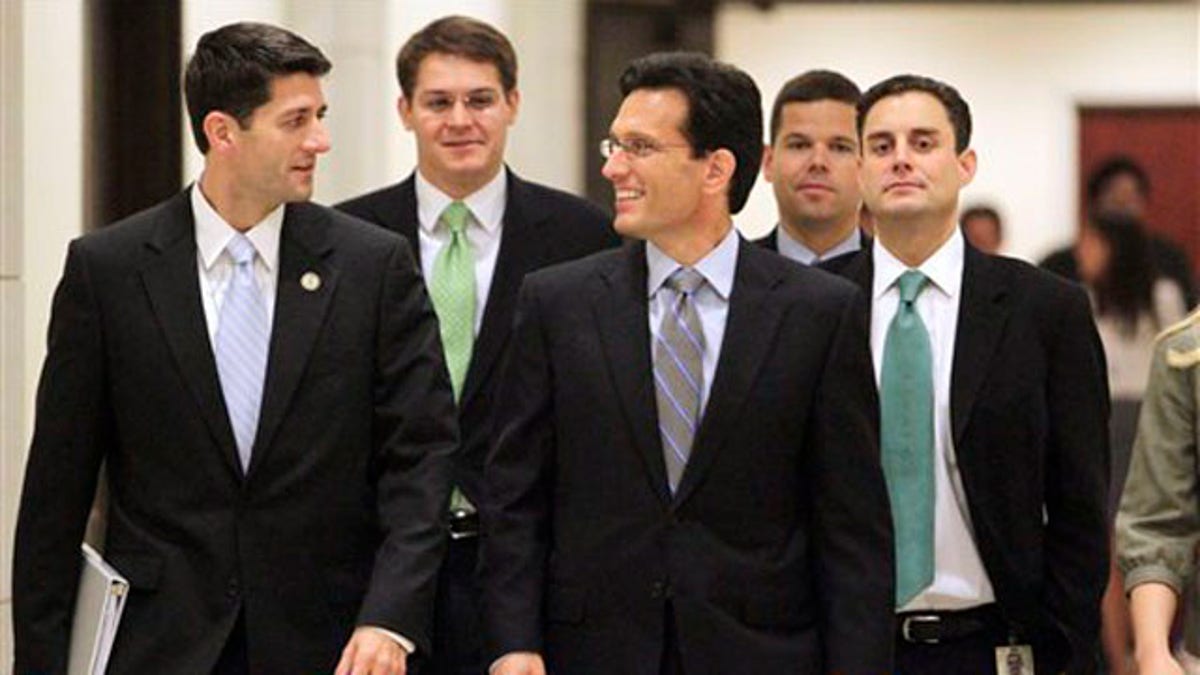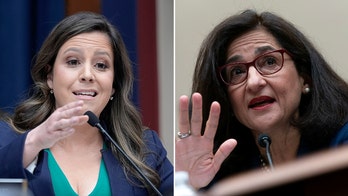
House Budget Committee Chairman Paul Ryan, left, and House Majority Leader Eric Cantor, center, and others walk to a news conference on Capitol Hill in Washington Aug. 1. (AP)
Just because Congress spent the last several months locking horns over the debt ceiling doesn't mean Republicans have forgotten how much they hate the health care overhaul.
They haven't.
And when lawmakers return from break after Labor Day, conservatives are planning a renewed effort to chip away at the law.
A new report Tuesday claiming budget analysts understated the cost of the law by up to $50 billion a year likely will only fuel concerns about the bill in a climate of austerity. Add that to GOP charges that the bill's individual mandate is unconstitutional, that its tax hikes will hurt the economy and that its subsidies represent another burden on a strained budget.
Though a full-fledged bill to repeal the law died in the Senate early this year following its symbolic passage in the House, Republicans are not giving up.
House Speaker John Boehner reminded Democrats last week, following another bleak unemployment report, that Republicans want to "repeal the job-crushing health care law with all of its mandates and tax hikes."
A spokeswoman for House Republican Leader Eric Cantor told FoxNews.com that Republicans will "continue our focus on undoing the flawed ObamaCare law" when Congress returns.
Specifically, the party is looking at a new proposal aimed at preventing workers from losing their current health plans.
"The president claimed that under ObamaCare if you liked your health care you could keep it, but his new law included a regulation that will actually prevent that from happening," Cantor spokeswoman Laena Fallon said. "We plan to take up legislation this fall to eliminate this harmful regulation to ensure that if people like their health care, they actually are able to keep it."
The legislation would pertain to regulations governing whether certain plans that existed before the health care bill was signed last March can be exempt from some requirements of the law.
Since the law was signed, the administration said even "grandfathered" plans must adhere to certain requirements, like no lifetime coverage caps. And the administration said the exempted plans would "lose their grandfather status" if they "significantly cut benefits or increase out-of-pocket spending for consumers."
Republicans worry the regulations could force small businesses to change their health plans.
Aside from new proposals, Congress is still sitting on a host of bills dealing with provisions in the health care law.
A House bill still in committee has nearly 200 co-sponsors and would repeal the so-called Independent Payment Advisory Board. That board is tasked with reining in Medicare growth.
Other proposals include a repeal of the 10 percent tanning tax; a repeal of certain requirements on state Medicaid plans; and a repeal of the so-called CLASS Act, which establishes a new long-term care insurance program.
In addition, Republicans may use the budget process to target funding for the bill. And while they try to undermine the bill in Congress, both parties are watching anxiously as the federal courts deal with a string of cases regarding the bill's individual mandate -- a constitutional question that may ultimately be decided by the Supreme Court.
So far, the GOP was able to notch one modest success -- with the help of President Obama -- by passing a repeal in April of the widely unpopular provision requiring businesses to report purchases of $600 or more. Because Democrats hold the majority in the Senate, Republicans would likely have to once again summon some bipartisan support to replicate that success.
Adding to the discontent is a new study that examined possible rising costs in the bill.
Researchers at the National Bureau of Economic Research reportedly found that Washington did not factor in the cost of insuring employees' families when designing the law -- in turn creating a scenario where subsidies could be denied because individuals would not be able to meet the minimum out-of-pocket requirements because they can't count family coverage toward that amount. But according to the Daily Caller, the researchers found employees could intentionally seek costlier insurance plans in order to pay more out of pocket and in turn qualify for subsidies.
"Clearly the result is lots more money being spent," said John Fund, a senior editor at The American Spectator.
Pete Sepp, executive vice president of the National Taxpayers Union, said the glitch "can't help" when it comes to preserving the law as is.
The White House, though, disputed the story. Spokesman Nick Papas said in a statement that the story was "not accurate" and that the law "will extend coverage to millions of Americans and bring down the cost of health care for all of us."
The law could continue to come under fire in the new joint congressional committee established under the recently signed deal to raise the debt ceiling. That committee is tasked with finding up to $1.5 trillion in deficit savings.
The health care law provisions could also be targeted if the committee fails to act. Under the terms of the committee, an automatic $1.2 trillion in cuts will be triggered if the committee falls short. Much of that is cuts to defense, but health care is also targeted and provisions of the federal overhaul could be vulnerable.
Keith Hennessey, former National Economic Council director, wrote on his blog that the possibility "injects ObamaCare spending squarely into" the committee's negotiations.
Some Republicans, though, aren't necessarily banking on the supercommittee to deal with the health care law. House Budget Committee Chairman Paul Ryan told "Fox News Sunday" that he doesn't want to overemphasize the committee's work "because Democrats have never wanted to put their health care bill on the table."
Sepp said the fact that Medicaid funds are exempted from the trigger shows the committee is not necessarily designed to tackle the health care overhaul -- as Medicaid is the vehicle for covering a large portion of the health care law's new beneficiaries.
Democrats have vowed to fight for the health care law's provisions, and fight hard.
Obama, in an April address, challenged Republicans to come at him again with repeal bills.
"If they want to have a fight, I welcome that fight, because I don't believe the American people are going to put the insurance industry back in the driver's seat," he said, accusing Republicans of wanting to "deregulate" the insurance industry.
"We've already been there," Obama said.




